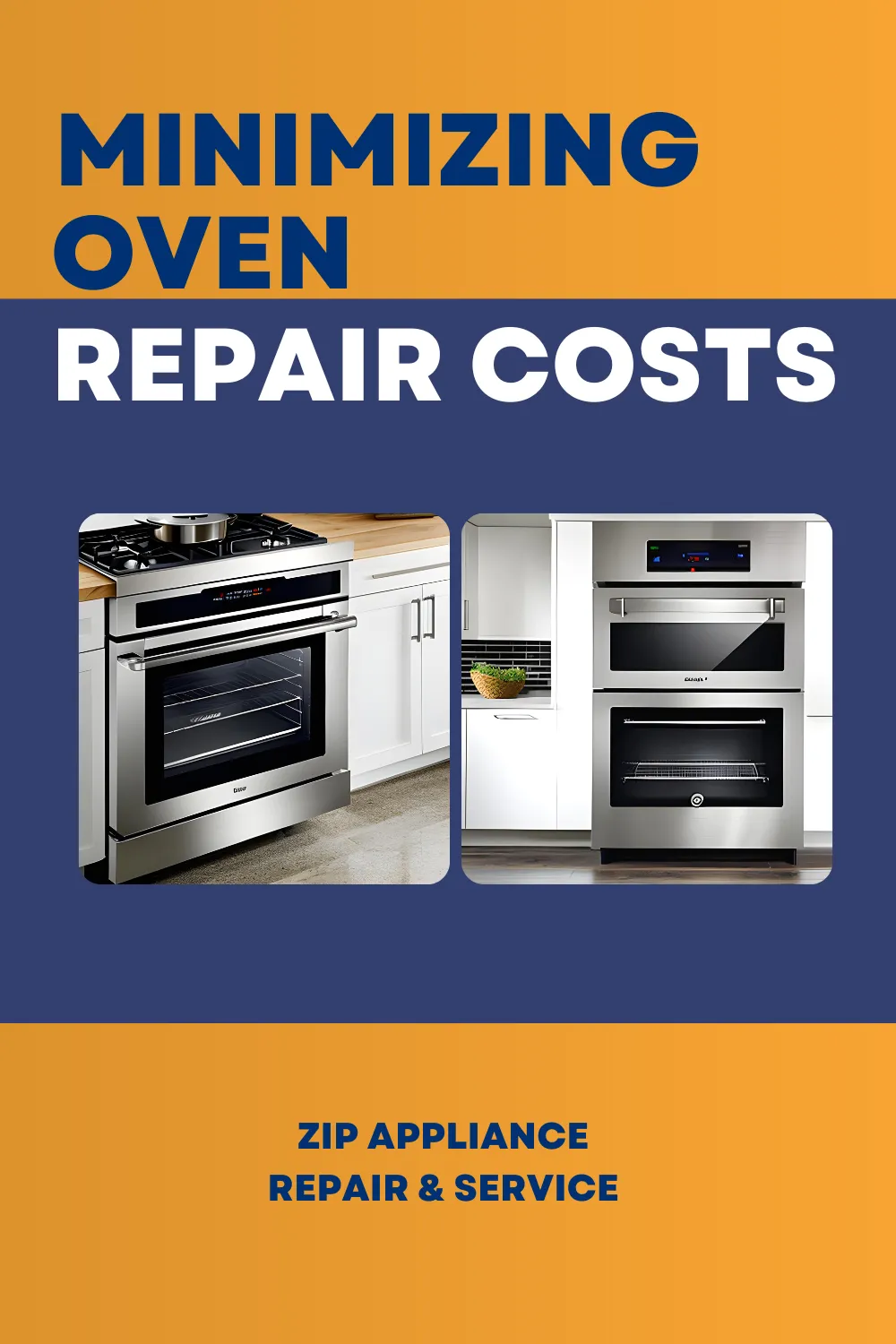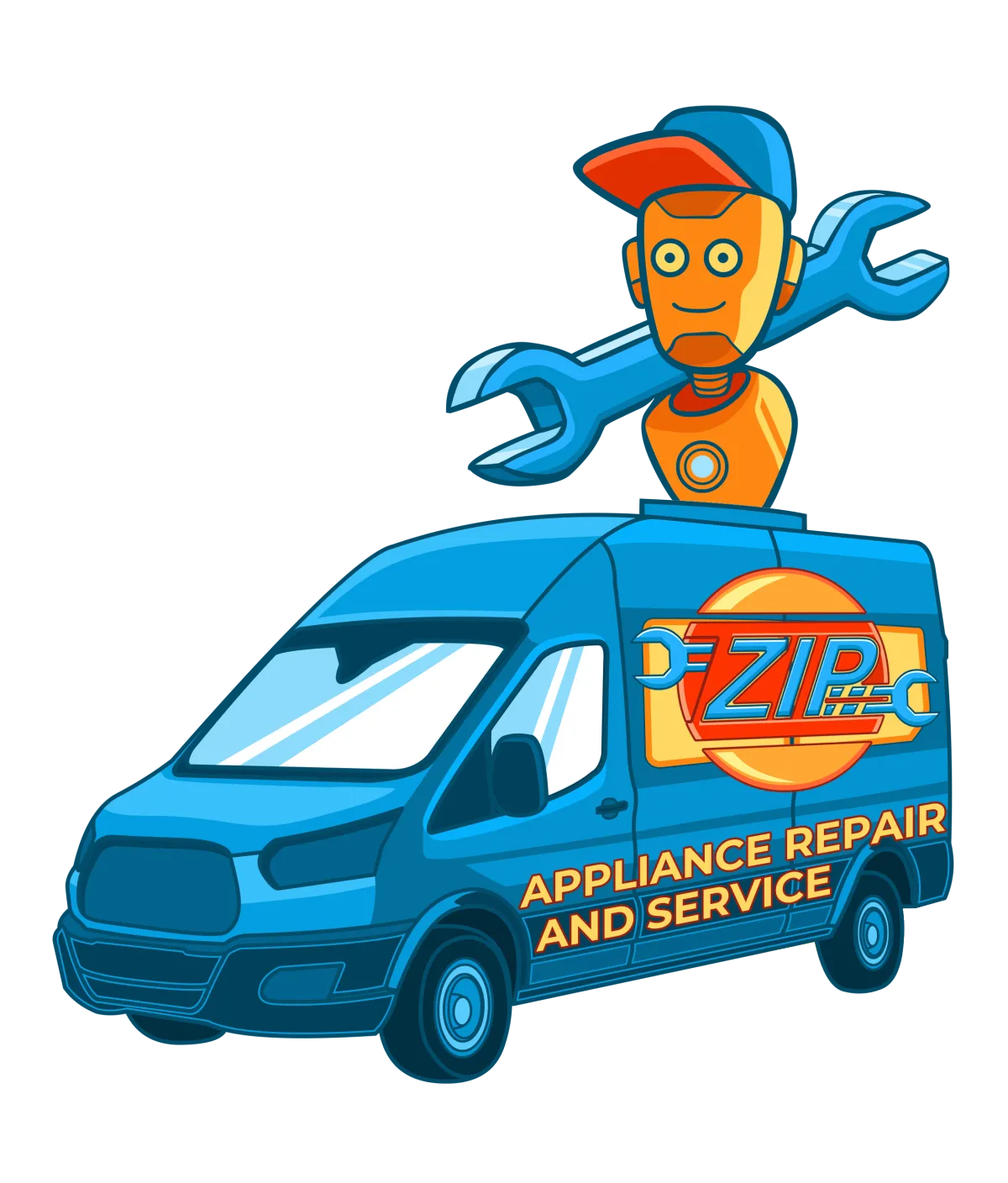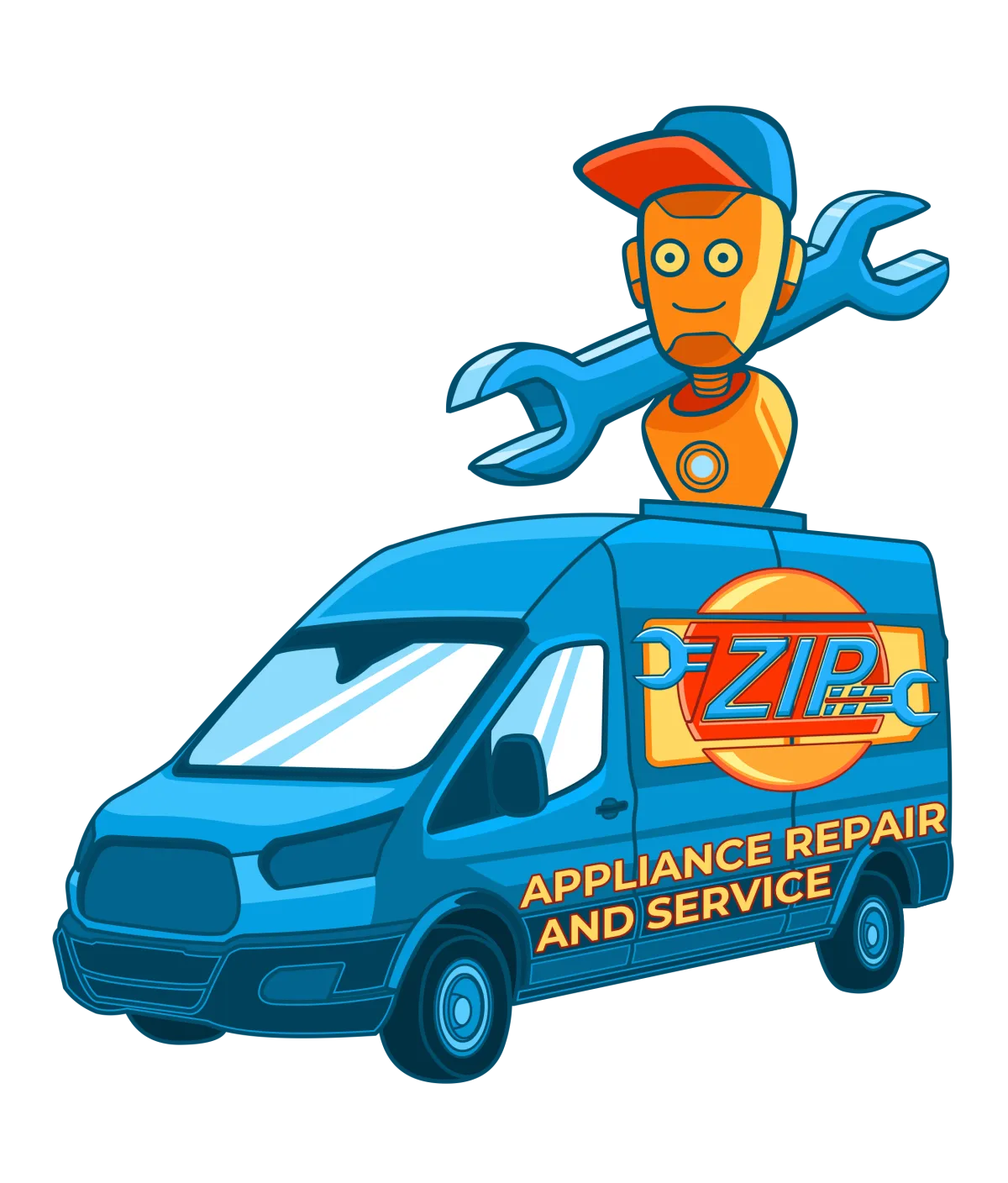THE FASTEST TOOLS IN TOWN
ZIP APPLIANCE REPAIR & SERVICE
Phone: (559) 272-4265
Phone: (559) 272-4265
Appliance Repair Tips For Fresno, CA Residents

Minimizing Oven Repair Costs – Essential Oven Maintenance Tips to Follow
Reducing Oven Repair Expenses – Effective Oven Maintenance Tips to Prevent Costly Repairs

An oven is a fundamental appliance in every kitchen, serving as the heart of culinary creations and family meals. However, like any other household equipment, ovens can experience wear and tear over time, leading to potential breakdowns and costly repair bills. In this blog, we'll explore essential oven maintenance tips that can help you extend its lifespan, prevent common issues, and ultimately avoid unnecessary repair costs. By incorporating these simple practices into your routine, you can keep your oven running smoothly and efficiently for years to come.
Regular Cleaning and Maintenance
Regular cleaning is the first line of defense in preventing oven issues. Grease, food debris, and spills can accumulate over time, leading to uneven heating, foul odors, and potential hazards. Make it a habit to clean your oven regularly, both inside and out. Remove the oven racks and soak them in warm, soapy water, then scrub away any residue. For the oven's interior, use a mild oven cleaner or a mixture of baking soda and water to tackle tough stains. Remember to wipe down the oven door and control knobs as well.
Cleaning your oven also has the added benefit of improving its energy efficiency. When there is a layer of grime and food buildup inside the oven, it acts as an insulator, causing the oven to work harder and consume more energy to reach the desired temperature. By keeping your oven clean, it can operate more efficiently, saving you money on your energy bills in the long run.
Check the Oven Door Seal
The oven door seal, also known as a gasket, plays a crucial role in maintaining the oven's temperature and preventing heat from escaping. Over time, the seal can become worn or damaged, leading to heat loss and inefficient cooking. Periodically inspect the door seal for any signs of wear, tears, or gaps. If you notice any issues, replace the seal promptly to ensure optimal heat retention and energy efficiency.
A faulty door seal can also lead to hotspots and uneven cooking inside the oven. When heat escapes through a damaged seal, the oven may struggle to maintain a consistent temperature, resulting in undercooked or overcooked food. Replacing a worn-out door seal is relatively inexpensive and can save you from potential food wastage and costly repairs.
Avoid Self-Cleaning Mode Excesses
Many modern ovens come equipped with a self-cleaning mode, a convenient feature to remove stubborn stains and residue. While this function can be useful, it generates extremely high temperatures during the cleaning process, which can put additional stress on the oven's components. To avoid potential damage, use the self-cleaning mode sparingly and follow the manufacturer's instructions carefully.
During the self-cleaning cycle, the oven reaches temperatures of up to 900 degrees Fahrenheit (480 degrees Celsius). This extreme heat can cause the oven's heating elements to warp or fail prematurely, leading to expensive repairs. Additionally, the high temperatures can also damage electronic components and control panels. If you need to use the self-cleaning mode, do so only when absolutely necessary and never leave the oven unattended during the process.
Use Oven-Safe Cookware
Using the wrong cookware can damage your oven and lead to costly repairs. Always use oven-safe cookware and avoid placing items directly on the oven's heating elements. Metal containers, aluminum foil, and some types of glassware can cause damage and create safety hazards. Invest in high-quality oven-safe pans and baking sheets to ensure even cooking and protect your oven from unnecessary wear.
Using inappropriate cookware can also result in food spills and drips that can damage the oven's heating elements and interior surfaces. For example, acidic foods like tomatoes or citrus can cause corrosion, while sugary spills can leave sticky residue that is challenging to remove. By using oven-safe cookware and ensuring that dishes are properly covered, you can protect your oven from potential damage and extend its lifespan.
Calibrate the Oven Temperature
A properly calibrated oven ensures accurate cooking times and consistent results. If you notice that your oven's temperature doesn't match the settings, it may need calibration. To do this, purchase an oven thermometer and place it in the center of the oven. Preheat the oven to a specific temperature and compare the reading on the thermometer to the set temperature. If there's a significant difference, consider calibrating your oven or consult a professional technician for assistance.
An oven that is not calibrated correctly can lead to undercooked or overcooked food, resulting in wasted ingredients and frustrating cooking experiences. Additionally, if the oven runs at a consistently higher temperature than indicated, it can lead to faster wear of the heating elements and other components. Calibrating your oven ensures that it operates at the intended temperature, providing accurate and reliable cooking results.
Avoid Oven Overloading
Overloading the oven with too many dishes can obstruct airflow and lead to uneven cooking. Additionally, placing dishes too close to the oven's heating elements can cause food to burn or the oven's internal components to overheat. Follow the manufacturer's guidelines regarding oven capacity and proper rack placement to ensure optimal performance and prevent potential repairs.
When you overload the oven, the hot air circulation may be restricted, leading to uneven baking or roasting. This can result in dishes that are not cooked evenly, with some parts being overdone while others remain undercooked. Moreover, overloading the oven can cause the internal temperature to rise excessively, putting a strain on the heating elements and potentially leading to premature failure.
Watch Out for Unusual Noises or Smells
Pay attention to any unusual noises or smells coming from your oven during operation. Grinding noises, rattling, or strange odors may indicate a problem with internal components or potential gas leaks (in gas ovens). If you notice any concerning signs, stop using the oven immediately and schedule a professional inspection to diagnose and resolve the issue before it escalates into a costly repair.
Unusual noises can be a warning sign of impending issues, such as malfunctioning fan motors, loose belts, or worn-out bearings. Ignoring these sounds and continuing to use the oven can exacerbate the problem and lead to more extensive damage. Similarly, strange odors could indicate electrical problems, faulty insulation, or gas leaks, all of which require prompt attention by a professional technician.

Schedule Professional Inspections
Even with regular maintenance, it's essential to have your oven professionally inspected and serviced periodically. Professional technicians can identify potential issues before they become major problems, saving you from more significant repair costs down the line. Regular inspections can also help you keep your oven's warranty valid and ensure it continues to operate efficiently.
During a professional inspection, a trained technician will thoroughly examine your oven's components, check for potential wear or damage, and clean hard-to-reach areas that may be challenging for homeowners to access. They can also perform tests to ensure that the oven is operating at the correct temperature and assess any potential safety concerns.
Maintaining your oven through regular cleaning, proper usage, and professional inspections is key to avoiding unnecessary repair costs and ensuring its longevity. By following these essential oven maintenance tips, you can enjoy hassle-free cooking experiences and peace of mind knowing that your oven is in top-notch condition. Remember that a well-maintained oven not only saves you money on repairs but also enhances your culinary creations and contributes to a well-functioning kitchen. Make oven care a priority in your household and reap the benefits of a reliable and efficient kitchen companion for years to come.
In addition to the cost-saving benefits, maintaining your oven also promotes safety and reduces the risk of accidents. An oven that is regularly cleaned and well-maintained is less likely to emit foul odors, smoke, or sparks during operation, reducing the chances of fires or other hazards. Taking proactive measures to care for your oven not only protects your investment but also ensures the safety of your household.
As you implement these oven maintenance tips, consider creating a schedule or checklist to help you stay on track with your maintenance tasks. Setting reminders for cleaning and professional inspections can help you avoid overlooking essential maintenance steps and ensure that your oven remains in optimal condition throughout its lifespan.
By being diligent with your oven maintenance, you can enjoy the convenience and efficiency of your appliance for many years without the stress of unexpected breakdowns and expensive repairs. A well-maintained oven will continue to serve as an invaluable tool in your kitchen, creating delicious meals and cherished memories for you and your loved ones. Invest the time and effort in taking care of your oven, and it will reward you with reliable performance and cost savings for years to come.
At Zip Appliance Repair & Service, we understand the importance of a well-functioning oven in your kitchen. Our team of experienced technicians specializes in oven repairs and is dedicated to providing top-notch service to keep your appliances running smoothly and your home comfortable.
Trust Zip Appliance Repair & Service for all your oven repair needs, and experience exceptional service from start to finish. Don't let oven issues linger – contact us at (559) 272-4265 or visit our website at fresno.ziprepairservice.com to schedule an appointment today, and let us take care of your oven repair needs promptly and efficiently.

Minimizing Oven Repair Costs – Essential Oven Maintenance Tips to Follow
Reducing Oven Repair Expenses – Effective Oven Maintenance Tips to Prevent Costly Repairs

An oven is a fundamental appliance in every kitchen, serving as the heart of culinary creations and family meals. However, like any other household equipment, ovens can experience wear and tear over time, leading to potential breakdowns and costly repair bills. In this blog, we'll explore essential oven maintenance tips that can help you extend its lifespan, prevent common issues, and ultimately avoid unnecessary repair costs. By incorporating these simple practices into your routine, you can keep your oven running smoothly and efficiently for years to come.
Regular Cleaning and Maintenance
Regular cleaning is the first line of defense in preventing oven issues. Grease, food debris, and spills can accumulate over time, leading to uneven heating, foul odors, and potential hazards. Make it a habit to clean your oven regularly, both inside and out. Remove the oven racks and soak them in warm, soapy water, then scrub away any residue. For the oven's interior, use a mild oven cleaner or a mixture of baking soda and water to tackle tough stains. Remember to wipe down the oven door and control knobs as well.
Cleaning your oven also has the added benefit of improving its energy efficiency. When there is a layer of grime and food buildup inside the oven, it acts as an insulator, causing the oven to work harder and consume more energy to reach the desired temperature. By keeping your oven clean, it can operate more efficiently, saving you money on your energy bills in the long run.
Check the Oven Door Seal
The oven door seal, also known as a gasket, plays a crucial role in maintaining the oven's temperature and preventing heat from escaping. Over time, the seal can become worn or damaged, leading to heat loss and inefficient cooking. Periodically inspect the door seal for any signs of wear, tears, or gaps. If you notice any issues, replace the seal promptly to ensure optimal heat retention and energy efficiency.
A faulty door seal can also lead to hotspots and uneven cooking inside the oven. When heat escapes through a damaged seal, the oven may struggle to maintain a consistent temperature, resulting in undercooked or overcooked food. Replacing a worn-out door seal is relatively inexpensive and can save you from potential food wastage and costly repairs.
Avoid Self-Cleaning Mode Excesses
Many modern ovens come equipped with a self-cleaning mode, a convenient feature to remove stubborn stains and residue. While this function can be useful, it generates extremely high temperatures during the cleaning process, which can put additional stress on the oven's components. To avoid potential damage, use the self-cleaning mode sparingly and follow the manufacturer's instructions carefully.
During the self-cleaning cycle, the oven reaches temperatures of up to 900 degrees Fahrenheit (480 degrees Celsius). This extreme heat can cause the oven's heating elements to warp or fail prematurely, leading to expensive repairs. Additionally, the high temperatures can also damage electronic components and control panels. If you need to use the self-cleaning mode, do so only when absolutely necessary and never leave the oven unattended during the process.
Use Oven-Safe Cookware
Using the wrong cookware can damage your oven and lead to costly repairs. Always use oven-safe cookware and avoid placing items directly on the oven's heating elements. Metal containers, aluminum foil, and some types of glassware can cause damage and create safety hazards. Invest in high-quality oven-safe pans and baking sheets to ensure even cooking and protect your oven from unnecessary wear.
Using inappropriate cookware can also result in food spills and drips that can damage the oven's heating elements and interior surfaces. For example, acidic foods like tomatoes or citrus can cause corrosion, while sugary spills can leave sticky residue that is challenging to remove. By using oven-safe cookware and ensuring that dishes are properly covered, you can protect your oven from potential damage and extend its lifespan.
Calibrate the Oven Temperature
A properly calibrated oven ensures accurate cooking times and consistent results. If you notice that your oven's temperature doesn't match the settings, it may need calibration. To do this, purchase an oven thermometer and place it in the center of the oven. Preheat the oven to a specific temperature and compare the reading on the thermometer to the set temperature. If there's a significant difference, consider calibrating your oven or consult a professional technician for assistance.
An oven that is not calibrated correctly can lead to undercooked or overcooked food, resulting in wasted ingredients and frustrating cooking experiences. Additionally, if the oven runs at a consistently higher temperature than indicated, it can lead to faster wear of the heating elements and other components. Calibrating your oven ensures that it operates at the intended temperature, providing accurate and reliable cooking results.
Avoid Oven Overloading
Overloading the oven with too many dishes can obstruct airflow and lead to uneven cooking. Additionally, placing dishes too close to the oven's heating elements can cause food to burn or the oven's internal components to overheat. Follow the manufacturer's guidelines regarding oven capacity and proper rack placement to ensure optimal performance and prevent potential repairs.
When you overload the oven, the hot air circulation may be restricted, leading to uneven baking or roasting. This can result in dishes that are not cooked evenly, with some parts being overdone while others remain undercooked. Moreover, overloading the oven can cause the internal temperature to rise excessively, putting a strain on the heating elements and potentially leading to premature failure.
Watch Out for Unusual Noises or Smells
Pay attention to any unusual noises or smells coming from your oven during operation. Grinding noises, rattling, or strange odors may indicate a problem with internal components or potential gas leaks (in gas ovens). If you notice any concerning signs, stop using the oven immediately and schedule a professional inspection to diagnose and resolve the issue before it escalates into a costly repair.
Unusual noises can be a warning sign of impending issues, such as malfunctioning fan motors, loose belts, or worn-out bearings. Ignoring these sounds and continuing to use the oven can exacerbate the problem and lead to more extensive damage. Similarly, strange odors could indicate electrical problems, faulty insulation, or gas leaks, all of which require prompt attention by a professional technician.

Schedule Professional Inspections
Even with regular maintenance, it's essential to have your oven professionally inspected and serviced periodically. Professional technicians can identify potential issues before they become major problems, saving you from more significant repair costs down the line. Regular inspections can also help you keep your oven's warranty valid and ensure it continues to operate efficiently.
During a professional inspection, a trained technician will thoroughly examine your oven's components, check for potential wear or damage, and clean hard-to-reach areas that may be challenging for homeowners to access. They can also perform tests to ensure that the oven is operating at the correct temperature and assess any potential safety concerns.
Maintaining your oven through regular cleaning, proper usage, and professional inspections is key to avoiding unnecessary repair costs and ensuring its longevity. By following these essential oven maintenance tips, you can enjoy hassle-free cooking experiences and peace of mind knowing that your oven is in top-notch condition. Remember that a well-maintained oven not only saves you money on repairs but also enhances your culinary creations and contributes to a well-functioning kitchen. Make oven care a priority in your household and reap the benefits of a reliable and efficient kitchen companion for years to come.
In addition to the cost-saving benefits, maintaining your oven also promotes safety and reduces the risk of accidents. An oven that is regularly cleaned and well-maintained is less likely to emit foul odors, smoke, or sparks during operation, reducing the chances of fires or other hazards. Taking proactive measures to care for your oven not only protects your investment but also ensures the safety of your household.
As you implement these oven maintenance tips, consider creating a schedule or checklist to help you stay on track with your maintenance tasks. Setting reminders for cleaning and professional inspections can help you avoid overlooking essential maintenance steps and ensure that your oven remains in optimal condition throughout its lifespan.
By being diligent with your oven maintenance, you can enjoy the convenience and efficiency of your appliance for many years without the stress of unexpected breakdowns and expensive repairs. A well-maintained oven will continue to serve as an invaluable tool in your kitchen, creating delicious meals and cherished memories for you and your loved ones. Invest the time and effort in taking care of your oven, and it will reward you with reliable performance and cost savings for years to come.
At Zip Appliance Repair & Service, we understand the importance of a well-functioning oven in your kitchen. Our team of experienced technicians specializes in oven repairs and is dedicated to providing top-notch service to keep your appliances running smoothly and your home comfortable.
Trust Zip Appliance Repair & Service for all your oven repair needs, and experience exceptional service from start to finish. Don't let oven issues linger – contact us at (559) 272-4265 or visit our website at fresno.ziprepairservice.com to schedule an appointment today, and let us take care of your oven repair needs promptly and efficiently.
If your dryer has been giving you problems, contact Zip Appliance Repair & Service at (559) 272-4265

Appliance Repair In A Zip
If you need a dryer repair call our Team at (559) 272-4265, or visit our online scheduling page to request service.
Appliance Repair
HAVE A QUESTION, CALL (559) 272-4265

Online Offers
Take advantage of our online discount offers - save time and money...

Residential & Commercial appliances
See what our company can do for you

Appliance Repair Tips
If your appliance is not working properly...

1405 Commercial Way ste 100
Bakersfield, CA 93309
Lic # 1116346
Equipment We Sevice
- A Call To Confirm Your Appointment Time
- A Email Detailing Your Assigned Technician
- Information Needed Before The Repair Can Be Started
- An Estimate Of Work To Be Done
© 2025 ZIP APPLIANCE REPAIR & SERVICE LLC







